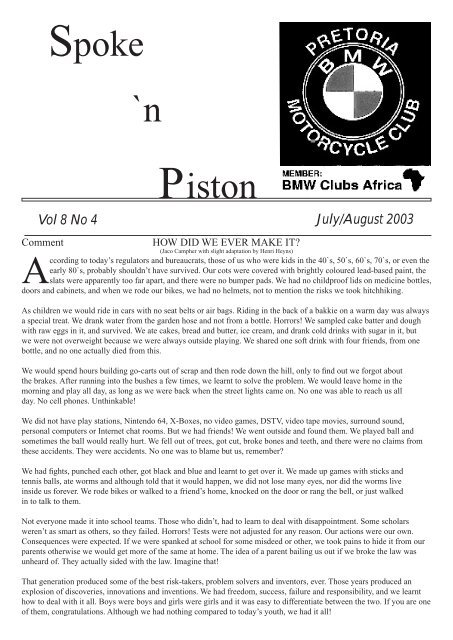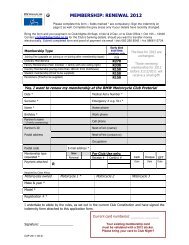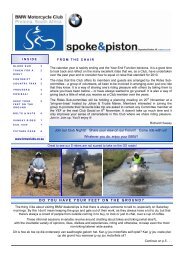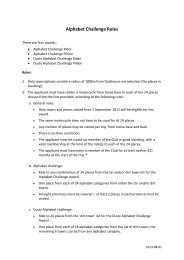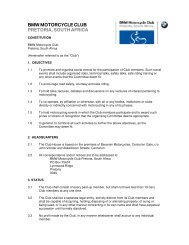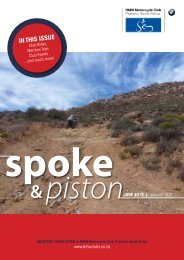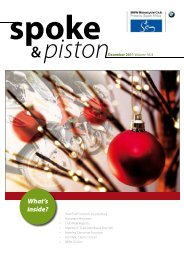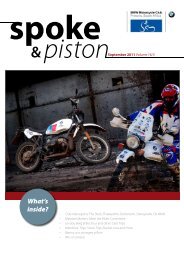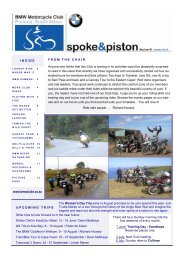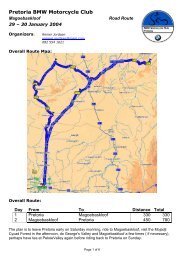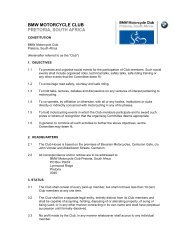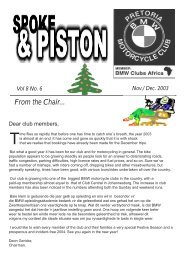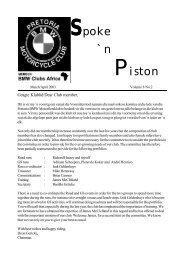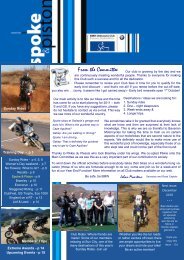Jul / Aug - BMW Motorcycle Club of Pretoria, South Africa
Jul / Aug - BMW Motorcycle Club of Pretoria, South Africa
Jul / Aug - BMW Motorcycle Club of Pretoria, South Africa
Create successful ePaper yourself
Turn your PDF publications into a flip-book with our unique Google optimized e-Paper software.
Spoke<br />
`n<br />
P iston<br />
Vol 8 No 4<br />
<strong>Jul</strong>y/<strong>Aug</strong>ust 2003<br />
Comment<br />
HOW DID WE EVER MAKE IT?<br />
(Jaco Campher with slight adaptation by Henri Heyns)<br />
According to today’s regulators and bureaucrats, those <strong>of</strong> us who were kids in the 40`s, 50`s, 60`s, 70`s, or even the<br />
early 80`s, probably shouldn’t have survived. Our cots were covered with brightly coloured lead-based paint, the<br />
slats were apparently too far apart, and there were no bumper pads. We had no childpro<strong>of</strong> lids on medicine bottles,<br />
doors and cabinets, and when we rode our bikes, we had no helmets, not to mention the risks we took hitchhiking.<br />
As children we would ride in cars with no seat belts or air bags. Riding in the back <strong>of</strong> a bakkie on a warm day was always<br />
a special treat. We drank water from the garden hose and not from a bottle. Horrors! We sampled cake batter and dough<br />
with raw eggs in it, and survived. We ate cakes, bread and butter, ice cream, and drank cold drinks with sugar in it, but<br />
we were not overweight because we were always outside playing. We shared one s<strong>of</strong>t drink with four friends, from one<br />
bottle, and no one actually died from this.<br />
We would spend hours building go-carts out <strong>of</strong> scrap and then rode down the hill, only to find out we forgot about<br />
the brakes. After running into the bushes a few times, we learnt to solve the problem. We would leave home in the<br />
morning and play all day, as long as we were back when the street lights came on. No one was able to reach us all<br />
day. No cell phones. Unthinkable!<br />
We did not have play stations, Nintendo 64, X-Boxes, no video games, DSTV, video tape movies, surround sound,<br />
personal computers or Internet chat rooms. But we had friends! We went outside and found them. We played ball and<br />
sometimes the ball would really hurt. We fell out <strong>of</strong> trees, got cut, broke bones and teeth, and there were no claims from<br />
these accidents. They were accidents. No one was to blame but us, remember?<br />
We had fights, punched each other, got black and blue and learnt to get over it. We made up games with sticks and<br />
tennis balls, ate worms and although told that it would happen, we did not lose many eyes, nor did the worms live<br />
inside us forever. We rode bikes or walked to a friend’s home, knocked on the door or rang the bell, or just walked<br />
in to talk to them.<br />
Not everyone made it into school teams. Those who didn’t, had to learn to deal with disappointment. Some scholars<br />
weren’t as smart as others, so they failed. Horrors! Tests were not adjusted for any reason. Our actions were our own.<br />
Consequences were expected. If we were spanked at school for some misdeed or other, we took pains to hide it from our<br />
parents otherwise we would get more <strong>of</strong> the same at home. The idea <strong>of</strong> a parent bailing us out if we broke the law was<br />
unheard <strong>of</strong>. They actually sided with the law. Imagine that!<br />
That generation produced some <strong>of</strong> the best risk-takers, problem solvers and inventors, ever. Those years produced an<br />
explosion <strong>of</strong> discoveries, innovations and inventions. We had freedom, success, failure and responsibility, and we learnt<br />
how to deal with it all. Boys were boys and girls were girls and it was easy to differentiate between the two. If you are one<br />
<strong>of</strong> them, congratulations. Although we had nothing compared to today’s youth, we had it all!
Techno speak for the not-so technical<br />
Part 6<br />
Lubricating Oils<br />
[Henri Heyns, Bruce Meyers and team with answers<br />
by David P. Beard <strong>of</strong> Caltex Oil (SA)(Pty) Ltd., JHB.]<br />
Q1. During the fifties and sixties I remember motor engines not<br />
being as long lived as now. A Morris Minor car, for example, was<br />
hard pressed to give 60 000 miles <strong>of</strong> service without a major<br />
engine overhaul, whereas today, an engine can clock 250 000<br />
km without appreciable wear. Similarly, motorcycle engines those<br />
days, possibly because they had no oil filters, were known<br />
to give even less service during their lifetimes. Are materials so<br />
much better today or is it due to better lubricants and lubrication?<br />
A. In short, yes. Everything has improved - materials are harderwearing,<br />
clearances and tolerances are tighter and the oil<br />
package has much greater protection abilities. Improvements in<br />
filtration systems have eliminated a lot <strong>of</strong> contamination, and even<br />
the fuel has improved, with less contaminants and insolubles (that<br />
could form varnishes).<br />
Q2. What are the criteria for oils in modern motorcycle<br />
engines? What should one look for in an oil?<br />
A. Always the most important criteria are what the manufacturer<br />
<strong>of</strong> the motorcycle recommends - both the viscosity grade and the<br />
quality level. However, there is no danger in moving to higher<br />
specification oil if the motorcycle is older and specifies an older<br />
spec. Having said that, the biggest issue with motorcycle engine<br />
oils compared to car engine oils is the inclusion <strong>of</strong> a wet clutch<br />
on certain makes. This affects the frictional requirements in the<br />
oil - although I understand that <strong>BMW</strong> has chosen the dry clutch<br />
route.<br />
Q3. Is it still necessary to change oil, especially engine oil,<br />
at short intervals? We know bikers who change oil plus a filter<br />
every 5000 km, whilst others change oil as soon as the slightest<br />
discoloration is noticeable. Is engine longevity appreciably<br />
extended hereby and does this procedure warrant the expense?<br />
A. Once again, the recommendation <strong>of</strong> the manufacturer is<br />
the gospel. If the specification is for 5000km drain intervals, it<br />
has been specified for a reason and is worth sticking to. It is<br />
noticeable, however, that drain intervals have increased over the<br />
years due to cleaner burning engines and stronger oil packages.<br />
It is possible to extend drain intervals on older vehicles but it is<br />
probably worth investing in oil testing along the way. In terms <strong>of</strong> oil<br />
discoloration, please remember that it is one <strong>of</strong> the oil's functions<br />
to clean the engine and this dirt is removed when the oil is drained<br />
and the filter is changed. The oil should get dirty; otherwise the dirt<br />
is remaining inside the engine and forming deposits. I always use<br />
the analogy <strong>of</strong> washing the dishes - if the dishwater is still clean<br />
when it goes down the drain, the dirt must still be on the dishes!<br />
Oil only needs to be drained when it can no longer fully protect<br />
the engine or it is contaminated. The latter is something that the<br />
vehicle owner will probably be aware <strong>of</strong> (leaking head gasket, etc),<br />
but the former has normally been established by the manufacturer,<br />
hence the recommended drain intervals. Draining the oil more<br />
<strong>of</strong>ten is not really necessary unless the vehicle covers very low<br />
mileage and then the oil should be changed based on time.<br />
Q4. Nowadays motor manufacturers generally advise longer<br />
periods <strong>of</strong> car/bike use before oil servicing is required. What<br />
is the motivation behind this perception and does it not<br />
fly in the face <strong>of</strong> the 'regular servicing is better' concept?<br />
A. I think this goes back to the previous answer - materials, fuels<br />
and oils are all improving and service intervals can safely be<br />
extended. (The manufacturer is losing revenue with longer service<br />
intervals, so they must have thought long and hard about it!).<br />
Most customers want longer service intervals to save costs and<br />
keep vehicles on the road for longer, and the manufacturers are<br />
competing for this perceived benefit.<br />
2<br />
Q5. Synthetic oils are all the rage today due to its<br />
perceived superior qualities over mineral oils. Is this true and<br />
if so, why is it superior?<br />
A. Synthetic oils are manufactured using a chemically produced<br />
base oil instead <strong>of</strong> the (much cheaper) mineral base oil sourced<br />
from crude oil. The main benefit <strong>of</strong> a synthetic oil is its oxidation<br />
stability - its ability to resist high temperatures longer than a<br />
mineral oil. The additives used in both base oils are pretty much<br />
the same and depends on the quality level <strong>of</strong> the finished oil and<br />
the oil company's preferences. The idea behind synthetics was<br />
originally that they could remain in service for much longer than<br />
minerals, hence justifying their cost. There are few manufacturers<br />
that will actually allow this, however, but some users have chosen<br />
to use synthetics anyway. I believe it is a personal choice based<br />
on economics and preferences, and the arguments will rage on<br />
for many years to come!<br />
Q6. Given the considerably higher price paid for synthetic oil,<br />
at what intervals should it be replaced with normal riding?<br />
A. Once again, we would refer you back to the manufacturer <strong>of</strong><br />
your vehicle for this information. For example, <strong>BMW</strong> cars have<br />
now specified that ONLY synthetics can be used in all their<br />
vehicles (as long as the oil carries the <strong>BMW</strong> approval) with the<br />
drain interval remaining the same!<br />
Q7. Would a more regular oil change with a good quality<br />
mineral multi-grade detergent oil (at an obviously lower price)<br />
be preferable to longer periods <strong>of</strong> riding with synthetic<br />
oil before changing?<br />
A. I think this is covered in the previous answers - first check the<br />
manufacturer's recommendations, then look at the economics.<br />
Q8. Bikers are warned against the use <strong>of</strong> synthetic oil<br />
in new machines before 10 000 km or so. Seemingly,<br />
synthetic oil doesn’t allow the piston rings to bed in properly,<br />
resulting in premature high oil consumption. Is this correct?<br />
A. It is true that synthetics (and some <strong>of</strong> the very high quality<br />
mineral oils) are so good at separating metal components that<br />
bedding in <strong>of</strong> the rings may not take place fully. Most new vehicles<br />
these days have been bench run to bed in so swapping to a<br />
synthetic immediately is not too much <strong>of</strong> an issue. It becomes<br />
an issue, however, when the engine is rebuilt and need to be<br />
bedded-in properly. This is when a lower quality oil (NOT a lower<br />
viscosity oil) is used to assist in this process. I would say that it is<br />
safe to swap to synthetics after about 5000km <strong>of</strong> running in.<br />
Q9. What about oil additives bought over the counter.<br />
Do they really do what they claim and are there no<br />
disadvantages to their use?<br />
A. I am afraid that this is something I could talk for an hour<br />
or two on! In short, when we formulate an oil it is blended to<br />
be a balance <strong>of</strong> additives and base oil designed to meet the<br />
manufacturers' specifications and the industry specification such<br />
as API SL, etc. Obtaining these approvals can cost up to US$<br />
1million per approval. If these aftermarket additives are good, we<br />
will use them within our formulations already; if they are not good<br />
or upset the balance <strong>of</strong> the oil, we will not use them. By adding<br />
an aftermarket additive, the approvals are no longer valid due to<br />
dilution, and the oil companies will walk away from any claims. The<br />
oil companies openly indicate which tests their oils have passed<br />
and where the testing was done. The additive companies are<br />
very secretive about the testing procedures and results; they do<br />
not have any industry approvals such as API, and I have yet to<br />
find a manufacturer who approves <strong>of</strong> aftermarket additives. In our<br />
experience, the best that we can say about the additives is that<br />
they MAY cause no damage.<br />
Q10. Are different oils recommended for air and water-cooled<br />
engines? If so, what are the principal attributes <strong>of</strong> each?<br />
A.Generally speaking, land-based vehicles have the same oils for<br />
water and oil cooled engines; the difference comes with two-stroke<br />
engines for boats and for land-based units. Air-cooled engines<br />
generally run a lot hotter than their water-cooled partners, and
the oil becomes more <strong>of</strong> a cooling medium. This may lead to<br />
increased oxidation <strong>of</strong> the oil - and the manufacturer will specify<br />
an oil to deal with this.<br />
Q11. There is a common belief that the more clogged a filter<br />
becomes, the better it filters whatever is passed through it. Do<br />
you agree? If not, how <strong>of</strong>ten should oil filters be changed?<br />
A. It is true that as particles become trapped on a filter they act<br />
as a second layer <strong>of</strong> filter material and can <strong>of</strong>ten remove smaller<br />
particles. However, the manufacturer will have specified a filter<br />
with an absolute rating that will take out all particles that could<br />
endanger the engine. The danger <strong>of</strong> the filter blocking is that it<br />
will go into bypass mode (if possible, otherwise oil starvation will<br />
occur) and unfiltered oil will circulate throughout the engine. Stick<br />
with the manufacturer's recommendations and don't "drain the oil<br />
but leave the filter to next time". Often clean oil will loosen some<br />
deposits and a clean filter will catch them.<br />
Q12. Looking at gear oils, please explain what a GL<br />
rating is. Why is it critical?<br />
A. I talked about API approvals before, with API SL being the<br />
highest petrol engine spec, and API CI-4 being the highest diesel<br />
engine spec. API GL is the approval range for gear oils. Generally<br />
speaking, API GL-5 is for diffs, and API GL-4 for transmissions.<br />
Once again, an API GL approval requires a number <strong>of</strong> tests and<br />
significant investment.<br />
Q13. Many bikers do not believe in changing gear oil (ever)!<br />
Others again maintain that a gearbox or differential 'breathes'<br />
and that when cooling down, the air trapped inside causes<br />
condensate to form which then runs down the inside walls,<br />
causing a layer <strong>of</strong> water at the bottom <strong>of</strong> the unit, which<br />
in turn causes corrosion. What is your viewpoint on the<br />
advisability <strong>of</strong> changing gear oil and at what intervals?<br />
A. I'm sounding like a stuck record! I would look at what the<br />
manufacturer recommends and change gear oil based on that. It<br />
is true that condensation eventually becomes water in the oil and<br />
can cause a problem. The good news is that when the gearbox is<br />
in use, the oil typically reaches 100 degrees C and the water is<br />
evaporated <strong>of</strong>f. Gear oil does degrade (slowly) and can become<br />
contaminated and therefore should be changed on occasion. I<br />
know that it can be a problem as the manufacturer didn't expect a<br />
vehicle to last very long and didn't even provide a drain plug! (This<br />
is the case with some older Triumph cars that I have, where the<br />
diff doesn't have a drain plug - fill for life!). The fact that there is no<br />
combustion occurring in the gearbox or diff (I hope!) means that<br />
the stress on the oil is much less when compared to engine oils -<br />
hence the longer drain intervals.<br />
Q14. What is the difference between lubricating oil used<br />
on petrol engines and that used on diesels?<br />
A.There are a number <strong>of</strong> differences, but the main one is to<br />
do with the contaminants produced when diesel burns. First,<br />
there is the sulphur; when this burns, it produces sulphur dioxide.<br />
When this combines with water vapour, sulphuric acid results<br />
and can cause corrosion <strong>of</strong> engine components. Diesel oils are<br />
manufactured with an alkaline base to absorb and neutralise<br />
the acid. Secondly, the incomplete combustion <strong>of</strong> diesel fuel<br />
results in soot, very fine particles <strong>of</strong> carbon. If these increase and<br />
agglomerate in the oil, the oil can become thicker and sludge.<br />
Eventually the oil becomes solid and engine seizure is not far<br />
behind. Diesel oils have a dispersant added to control the soot<br />
and stop it from agglomerating. Diesel oils will always be black on<br />
draining; petrol oils will typically be a dark brown.<br />
Q15. I have <strong>of</strong>ten heard <strong>of</strong> bikers using diesel fuel oil in<br />
their engines as a flushing agent. After draining the old oil<br />
they add a few litres <strong>of</strong> diesel. They don’t really run the<br />
engine but turn it over a few times with the starter motor<br />
to remove sludge and other impurities, then drain it before<br />
filling up with fresh oil. Is this modus operandi recommended?<br />
A. At Caltex, we don't recommend any flushing procedures, for<br />
three reasons. First, engine oils have improved so much over the<br />
3<br />
years that the detergent additives can keep the engine spotless<br />
from one drain to the next. If someone insists on flushing out the<br />
engine, rather do it with the oil that they are going to use next.<br />
Second reason is that the thinner product may hang around after<br />
the flush and thin down the oil that is added. Lastly, a number <strong>of</strong><br />
engines have hydraulic lifters/tappets which trap oil in them. If the<br />
flushing oil gets into them, it may not come out again, resulting in<br />
incorrect valve operation and damage. There may also be an issue<br />
with seals not being compatible with the flushing agent.<br />
Q16. Some Japanese motorcycle manufacturers use an<br />
integrated engine/gearbox arrangement whereby the engine oil<br />
serves both units. Is this a workable arrangement over the<br />
long term in view <strong>of</strong> the fact that engines normally run<br />
on thinner oil than transmissions?<br />
A. It certainly seems to work well, and these days, the viscosity <strong>of</strong><br />
the engine oil and gearbox oil is not that different. As I said earlier,<br />
the issue is the friction characteristics <strong>of</strong> the oil that may cause<br />
slipping in the clutch. Many vehicles have run successfully with a<br />
common engine/gearbox sump, from the first days <strong>of</strong> the Mini!<br />
Q17. Is there a danger in mixing mineral with full synthetic<br />
engine oils at a service station? Could such mixing be tolerated<br />
under an extreme emergency?<br />
A.It is one <strong>of</strong> the requirements that all engine oils are compatible<br />
with all others, whether synthetic or mineral and from different<br />
oil companies, so, no, there isn't a danger in mixing these oils.<br />
However, by topping up synthetic oil with a mineral oil, some <strong>of</strong> the<br />
benefits <strong>of</strong> the synthetic will be lost in proportion to the quantity<br />
<strong>of</strong> the top-up.<br />
Q18. Where part-synthetic oils are concerned, what percentage<br />
is mineral? Which lubrication function is addressed by<br />
the synthetic portion?<br />
A. In my opinion, this is more <strong>of</strong> a marketing drive than a technical<br />
drive. Part synthetic can mean anything from 1% to 99%; there is<br />
no spec for it. Different oil companies will market different benefits<br />
from the use <strong>of</strong> the part synthetic.<br />
Q19. Is the use <strong>of</strong> full synthetic oil, given its high price,<br />
recommended for ordinary riding?<br />
A. I think this has been covered in previous answers. It comes<br />
down to personal preferences and economics. Sometimes users<br />
reckon they should use the most expensive oil to protect a piece <strong>of</strong><br />
equipment that they just paid over R100 000 for!<br />
Q20. What is the advantage <strong>of</strong> using synthetic transmission<br />
oil over its mineral counterpart?<br />
A. Similar issues to the engine oil, I think. There is a tendency<br />
to "forget" about the gear oil, so a synthetic is a good insurance<br />
policy.<br />
Wanted<br />
Articles, news items, anecdotes, experiences, stories,<br />
jokes, etc. for publication in our newsletter. Everyone<br />
knows something or has had an experience that he can<br />
share with others. Pictures are also welcome.<br />
If you have had an interesting or perhaps unpleasant<br />
experience on holiday, on a trip or even at home, tell us<br />
about it. If you wish to share a tip or give advice relating to<br />
motorcycles or motorcycling, we would like to hear it,<br />
Don`t be concerned about grammar, spelling, word choice<br />
or such mundane matters. We will attend to that.<br />
Afrikaanse bydraes is ook welkom.
As I See It…<br />
The best shock absorbers<br />
(Henri Heyns)<br />
The other day I saw a biker going through a series <strong>of</strong> potholes at a fairly high speed. It was obvious<br />
that he didn’t expect them or he would have taken evasive action. The bike bucked and shook a bit but<br />
besides what must have been a severe jarring to the rider’s spine, nothing else happened. Our roads today<br />
are littered with ruts, potholes, surface cave-ins and such other nasties. Every rider should expect to find them<br />
everywhere and know how to handle them. What drew my attention to this occurrence is the rider’s inexperience<br />
in traversing this obstacle. He didn’t make use <strong>of</strong> the best shock absorbers in the world — his knees! This is the<br />
typical reaction <strong>of</strong> a car driver turned biker, where he expects the suspension and the seats to do all the work<br />
whilst hanging onto the handle bars for dear life and hoping for the best.<br />
The owner <strong>of</strong> a bikers` <strong>of</strong>f-road driving school, featured prominently in this newsletter a few editions ago,<br />
makes no bones about the importance <strong>of</strong> learning to ride out <strong>of</strong> the saddle. In fact, the first day <strong>of</strong> training at<br />
his farm is spent almost entirely riding whilst standing up. One reason is the importance <strong>of</strong> learning to balance,<br />
another is that the centre <strong>of</strong> gravity is lowered significantly from saddle height to that <strong>of</strong> the foot pegs, making<br />
the bike more stable. A third reason is that your knees absorb most <strong>of</strong> the road shock when going through a<br />
dip or traversing rough terrain. One could add a fourth reason and that is enabling one to stretch legs a bit and<br />
rest a weary tail-end whilst on a long trip, without having to stop and get <strong>of</strong>f. I’m sure one can think <strong>of</strong> even<br />
more reasons for riding on the pegs, so to speak.<br />
But is it safe to ride in this manner, the reader may well ask. The answer is both yes and no, depending on<br />
the circumstances under which such riding is done. Of course, I’m not suggesting that you ride standing up,<br />
but when going through a dip or over a hump, or once every half hour or so, at least give your quadriceps the<br />
exercise. You may be surprised at how relaxing that action can be. Some guys might argue that standing up<br />
doesn’t suit the controls arrangement on a bike as you hands then rest at an uncomfortable angle. That is easy<br />
to rectify. Simply slacken <strong>of</strong>f the control clamps on the handle bars, tilt everything slightly upward, retighten the<br />
clamps and voilà, you can stand up as <strong>of</strong>ten as you like.<br />
Another bit <strong>of</strong> advice when riding is to clamp the fuel tank between your knees. It immediately makes a<br />
difference to your riding posture, your balance is better and it can help take the tension <strong>of</strong>f your arms and<br />
wrists.<br />
Please bear in mind that stretching your legs this way should only be done when it is safe to do so. This means<br />
a straight, windless, dry, level, even, traffic-free, tar road, whilst travelling at a reasonable speed. Remember<br />
though that at no time should you take your hands <strong>of</strong>f the controls. This latter action is only for world-class<br />
riders and exhibitionists on TV.<br />
<strong>Motorcycle</strong> Dealer, F&I Manager <strong>of</strong> the year<br />
Bavarian <strong>Motorcycle</strong>s earns the Accolades<br />
At the 2002 Dealer <strong>of</strong> the Year awards function held<br />
recently at Rovo`s Rail`s Capital Park Station in<br />
<strong>Pretoria</strong>, Bruce Meyers and Bianche Booysen walked<br />
<strong>of</strong>f with the laurels <strong>of</strong> being the Top <strong>Motorcycle</strong><br />
Dealer and Finance & Insurance Manager <strong>of</strong> the year<br />
respectively.<br />
Both winners ascribe their success to embracing<br />
excellence, an impatience with mediocrity, constantly<br />
honing pr<strong>of</strong>essional skills and being prepared to go<br />
that extra kilometre to satisfy clients. They say they<br />
believe in making clients <strong>of</strong> friends and friends <strong>of</strong><br />
clients.<br />
4<br />
Sharing their elation is Keith Dye, <strong>BMW</strong> MD in the<br />
photograph left.
Tyres ‘n Bikes<br />
(Donna Clausen)<br />
I<br />
was requested to write this article by Henri,<br />
editor <strong>of</strong> Spoke & Piston, but must warn<br />
you up front that you may not believe<br />
it. I decided to change from road tyres to<br />
‘knobbies’ in order to do more ‘back-road’<br />
riding, i.e. gravel. It is there that the most<br />
beautiful scenery is to be found; where your<br />
heart-beat sky-rockets as you take on the<br />
challenges and you sweat a brick when<br />
trouble starts. I never liked company on the<br />
road, anyway, and out there where hardly a<br />
road rule exists, there is no greater freedom –<br />
<strong>of</strong> spirit or adventure.<br />
Off went the Bridgestones, which I had<br />
always fitted to all my <strong>BMW</strong>’s. On these I<br />
averaged 24 000-26 000 km on the rear and<br />
close to 20 000 on the front. I had done<br />
enquiries about which would be most suitable<br />
‘knobbies’ and decided on the Conti’s. I was<br />
warned that I would average approximately<br />
8 000 k’s on the rear. My odometer read<br />
54 560 the day the Continental TK66’s went<br />
on.<br />
I do both <strong>of</strong>f-road (ask Jan du Toit <strong>of</strong> Country<br />
Trax) and road touring with my GS 1150 and<br />
travel to work daily throughout the year. Since<br />
the toll-gate on the N1 has become a general<br />
pain-in-the-neck to all who drive, especially<br />
bikes, I altered my route to go through town.<br />
Waterklo<strong>of</strong> Ridge to Rosslyn, to give you an<br />
idea <strong>of</strong> stop-starts. Finally, the time came to<br />
change tyres again – the odo read 74 100 -<br />
an average on the back tyre <strong>of</strong> 19 540! The<br />
front tyre was still good for another odd 100s.<br />
Of course, nobody will believe this or there<br />
is a chorus <strong>of</strong> ‘female driver, she probably<br />
putts along.’ Not so! My philosophy has<br />
always been, I drive an extremely powerful<br />
motorbike. The power is there on the throttle<br />
when I need it. So, to twist the grip and<br />
generally drive badly as a result, merely<br />
makes an idiot out <strong>of</strong> me. The power<br />
ultimately lies in the size <strong>of</strong> the GS – rather<br />
intimidating – I just go along for the ride.<br />
I never really contemplated why I got such a<br />
good mileage until Henri asked me to write<br />
the article and include the reasons. So I<br />
started concentrating on my driving:<br />
5<br />
>Do not drop the clutch on pull away –<br />
smooth gear change<br />
>Do not pull away at speed<br />
>Do not chase robots – they catch you<br />
along the line anyway<br />
>Do not suddenly accelerate unless in<br />
an emergency situation to clear potential<br />
problems<br />
>Use gear shifting for slowing down, rather<br />
than yanking on the front brake<br />
>Check tyres weekly and alter pressure<br />
according to requirements – 0.8 for<br />
serious sand, 2.5 for regular town and 3.0<br />
with load<br />
>Ensure suspension properly set per<br />
requirements<br />
>Ensure shocks always in excellent<br />
condition<br />
>Do not fiddle with the damping selection<br />
unless absolutely necessary<br />
>Keep an eye on road surfaces as a habit<br />
– look approximately 20-50 metres ahead<br />
to avoid unpleasant surprises like potholes<br />
>If you travel a regular route at a<br />
routine time, get to know the flow <strong>of</strong> the<br />
traffic, which robots change rapidly so<br />
accelerating between them is a waste.<br />
When traffic becomes snarled slow down<br />
in advance, avoiding sudden braking.<br />
>Do not use the rear brake unnecessarily<br />
– it chews rubber!<br />
Then I thought, if I write all this down, most<br />
will reckon that it is too much <strong>of</strong> a headache,<br />
all these do nots. Well, the bottom-line simply<br />
is be a thoughtful rider. Consider your bike<br />
– we are riding <strong>BMW</strong>’s after all and they<br />
deserve dignity – consider others. The rest<br />
simply follows.<br />
Dillon Meyers and Bianche Booysen from<br />
Bavarian <strong>Motorcycle</strong>s hold up the Continental<br />
TKC 80 ‘Twinduro’ tyre that had done almost 20<br />
000 km on Donna`s 1150 GS. Is this a record?
Tribute to <strong>BMW</strong> protective clothing<br />
(Henri Heyns)<br />
The other day, GS rider Tjaart Steenekamp was<br />
knocked down by a minibus taxi, damaging his bike<br />
and causing extensive injuries to himself. He reports<br />
that had he not been wearing safety apparel, his injuries<br />
may well have been fatal.<br />
We Salute a Top Achiever<br />
(Henri Heyns)<br />
A lecturer in computer science, T.J., as he is commonly<br />
called, was on his way to work when stopped<br />
by a robot at Four Ways in Johannesburg. After pulling<br />
<strong>of</strong>f in the left hand lane and travelling at 40-50 km/h,<br />
the taxi, moving over from the right hand lane with the<br />
intention <strong>of</strong> crossing over into the ‘no go’ yellow linedemarcated<br />
area, knocked him <strong>of</strong>f his bike. In the fall<br />
TJ broke both wrists, his right ankle and an elbow.<br />
The erring driver drove on without stopping. Fortunately<br />
a wide-awake lady driver followed the taxi and<br />
took down the registration number. (The defaulter was<br />
duly apprehended.) A male motorist helped drag the<br />
bike to safety whilst another kindly lady took TJ to<br />
hospital where he was kept for 2 days.<br />
TJ was wearing a Systems 4 <strong>BMW</strong> helmet, a riding<br />
jacket and breeches, heavy duty gloves and substantial<br />
foot wear. The helmet visor was smashed in the<br />
accident and the gloves destroyed, whilst the jacket,<br />
although severely abraded, kept intact. J.J., now thoroughly<br />
aware <strong>of</strong> the forces that come into play when<br />
a rider is knocked down on tarmac, keeps emphasising<br />
the importance <strong>of</strong> suitable protective clothing to be<br />
worn at all times. This he says, is equally important<br />
whether undertaking a long trip or just going for a test<br />
ride or to the shop nearby.<br />
Of equal importance is the quality <strong>of</strong> the riding<br />
apparel. A terrific amount <strong>of</strong> research goes into determining<br />
what types <strong>of</strong> materials are ideal for motorcycling<br />
conditions, taking cognisance <strong>of</strong> protective characteristics,<br />
longevity and wearing comfort in all types<br />
<strong>of</strong> weather. Obviously the better type <strong>of</strong> protection<br />
always costs more. That is a fact <strong>of</strong> life. But where<br />
life and limb are dependent upon that piece <strong>of</strong> material<br />
between you and the tarmac, should things go wrong,<br />
any money you pay is cheap at the price. Therefore,<br />
J.J. echoes the viewpoint that cheap equipment is<br />
little more than worthless. Go for the best you can<br />
afford. Frankly, I would go for the stuff <strong>BMW</strong> makes.<br />
That’s the real thing. Your life may depend on it! Also<br />
please remember that accidents happen very quickly<br />
and unexpectedly and unfortunately, the rider always<br />
comes <strong>of</strong>f second best.<br />
Sorry to hear about your mishap J.J. We all wish you<br />
a speedy and complete recovery and look forward to<br />
seeing you around some more – all in one piece again!<br />
6<br />
If you’ve ever visited Bavarian <strong>Motorcycle</strong>s in Ockerse<br />
Street, <strong>Pretoria</strong>, you will have come across a<br />
beehive <strong>of</strong> motorcycle activity all over where staff<br />
do their thing purposefully, speedily, efficiently, and<br />
with a smile. One would therefore not be surprised if a<br />
staff member from this company is selected by <strong>BMW</strong><br />
as a top achiever in one or other category.<br />
Leonardo Spinola, known by everyone as Lennie, was<br />
chosen from all dealers as <strong>Motorcycle</strong> Mechanic <strong>of</strong> the<br />
Year for 2003. He is a wide-awake, charming young<br />
man <strong>of</strong> 28 years, who matriculated in 1993 at the<br />
Hillview High School in <strong>Pretoria</strong>, with the added distinction<br />
<strong>of</strong> having been Head Boy at his school for<br />
that year. A further feather in his cap lies in the fact<br />
that he completed his trade test successfully to become<br />
a qualified motorcycle mechanic after having served<br />
only one-and-a-half years <strong>of</strong> his apprenticeship.<br />
Apart from being a dedicated worker, Lennie is also<br />
interested in soccer, baseball and cycling. He races<br />
motorcycles to an extent but not seriously, is unmarried<br />
and in his spare time helps his widowed mother at<br />
their butchery in town somewhere. His life philosophy<br />
is a declared impatience with mediocrity, hence his<br />
exemplary work performance.<br />
In appreciation <strong>of</strong> his outstanding performance <strong>BMW</strong><br />
treated Lennie to a whistle stop tour <strong>of</strong> Germany for a<br />
week where he will visit, inter alia, the <strong>BMW</strong> Works,<br />
attend a Rally, an exhibition, as well as visiting several<br />
<strong>BMW</strong> dealers.<br />
Spoke `n Piston, the club members and your colleagues<br />
congratulate you on this outstanding achievement,<br />
Lennie. You have earned it through hard work,<br />
superior skills and an untiring desire <strong>of</strong> always giving<br />
your best. May you continue to climb the ladder <strong>of</strong><br />
success until you reach the pinnacle in your chosen<br />
pr<strong>of</strong>ession. This recognition could not have happened<br />
to a nicer guy and we all are proud <strong>of</strong> you!
Stunt rider madness<br />
(Henri Heyns, excerpted from an article in Bike, February 2003)<br />
In a British bike magazine it is reported that a young<br />
American stunt rider visiting that country earns a living<br />
by doing inter alia, complete somersaults on his 250cc<br />
two-stroke machine. Mike Metzger, described as a 27-yearold<br />
free style fanatic and self-confessed ‘Godfather <strong>of</strong> Free<br />
Style Motocross’, made history by performing the first ever<br />
motorcycle back-flip on British soil recently.<br />
Older bikers will remember the famous Evel Knievel who,<br />
in years gone by also enthralled spectators by jumping his<br />
bike over buses parked alongside <strong>of</strong> each other. But that<br />
was then and Mike wasn`t to be outdone by merely jumping<br />
over more buses. No, he was onto something much more<br />
daring than that. Everyone who follows the stunt riding<br />
business will know that tricks like heel clicking <strong>of</strong> the<br />
rider whilst in free flight is nothing new, so this lad from<br />
southern California had to take something special out <strong>of</strong><br />
the hat.<br />
A specially designed steel ‘kicker’ ramp 2,5 m high, built<br />
at an angle that makes a ski jump look like a speed bump,<br />
was used as a launch pad for the attempt. The run-up to<br />
the 70º structure is a little more than 12 m, <strong>of</strong> which Mike<br />
uses only about 30%. By the time Mike`s front wheel is<br />
airborne, he`s leaning as far over the rear fender as his arms<br />
will allow. With his head thrown back he rotates the 100kg<br />
weight under him backwards. Halfway over the 15 m jump<br />
he is completely upside down. At the landing end, after<br />
travelling 10 m high through space, things also have to be<br />
spot on and within a split second he`s back on two wheels,<br />
landing s<strong>of</strong>tly and so controlled that it seems the easiest<br />
thing to do. A jump like this has more to it than merely<br />
hitting the ramp at the correct speed and then holding<br />
on for dear life, Evel Knievel-like. Knowing that riders<br />
are reacting and adjusting the bike`s attitude whilst in midair,<br />
makes watching modern motocrossers fly even more<br />
fascinating.<br />
The American explained that he had attempted 26<br />
consecutive back somersaults on his BMX pedal cycle<br />
before mustering sufficient confidence to attemp it on a real<br />
bike. Yet, he cannot explain how he does it. It must be in<br />
your heart and head with plenty <strong>of</strong> practice to do a thing<br />
like this, he says.<br />
Has he ever come short on any <strong>of</strong> these escapades? Yes,<br />
<strong>of</strong> course. Everyone learns the hard way. At a practice<br />
some time ago he became unstuck and came down hard.<br />
“Breaking my back was bad”, he is reported to have said.<br />
“The broken femur was really bad, but breaking my jaw<br />
and crashing five teeth has to be the worst pain <strong>of</strong> my<br />
life. I couldn`t eat for three months”. Needless to say,<br />
Mike now sports five gold teeth in his mouth, perhaps poor<br />
recompense for all the pain and discomfort he`s had to<br />
endure. Did he stop this foolishness after that? Of course<br />
not. Otherwise this story could never have been written!<br />
7<br />
Veiligheidswenke vir wanneer ons ry<br />
Nou-die-dag het iemand my gebel om `n afskrif te vra<br />
van die veiligheidswenke wat Thys Leibbrandt `n<br />
rukkie gelede aan ons gestuur het. Ek het dit goed<br />
gedink om hulle sommer hierin weer te publiseer vir almal<br />
se kennisname.<br />
1. Moet nooit in die nag ry nie. Al die gruwels op die pad is<br />
snags onsigbaar en kan jou doodmaak.<br />
2. Ry in die middel van jou baan/pad. As iets verkeerd gaan<br />
het jy meer beweegspasie om na links <strong>of</strong> regs uit te swaai.<br />
3. As dit die vorige nag gereën het, kan jy verseker wees<br />
van sand, opdrifsels en klippe op al die draaie. Menige<br />
’ontbytryer’ het al so geval op `n Sondagoggend.<br />
4. Alkohol maak mens lomerig. Op die lang pad sal k<strong>of</strong>fie<br />
<strong>of</strong> `n koeldrankie die dors les en jou wakker hou.<br />
5. Moenie links van die geelstreep ry nie. Al die rommel op<br />
die pad vergader daar, soos hierbo uitgewys. Vermy ook om<br />
oor die trukaatsers <strong>of</strong> ‘katoë’ in die middel van die pad te ry.<br />
Baie van hulle is beskadig en sny jou fiets se bande.<br />
6. Reis met min bagasie. Daar is altyd die versoeking om<br />
die kant-tasse te oorlaai met onnodighede. Op `n kort toer<br />
pak eerder `n klein rugsak met die noodsaaklikste en los<br />
die kant-tasse by die huis. Jy gaan lekkerder ry en minder<br />
windweerstand hê, met beter petrolverbruik en hantering.<br />
7. Gebruik oorpluisies. Windgeraas in jou ore en valhelm is<br />
die grootste enkele faktor wat tot uitputting en verlies aan<br />
konsentrasie aanleiding gee .<br />
8. Veiligheidsmarge. Afhangende van jou vernuf, aanleg<br />
en ervaring, bou vir jou `n selfopgelegde veiligheidsmarge<br />
in jou rystyl in. Dit is binne hierdie 20-30% waarin<br />
jy met relatiewe veiligheid drasties kan reageer om `n<br />
noodtoestand onder beheer te kry. Ry jy op die rand van<br />
jou vermoëns, verval hierdie buffer. In `n noodsituasie sal jy<br />
verseker val - fantaseer in jou ergste nagmerries van `n band<br />
wat bars, `n dryfas wat vasslaan <strong>of</strong> `n ketting wat breek,<br />
diere wat uit nêrens in die pad verskyn, <strong>of</strong> die taxi wat die<br />
bekende U-draai voor jou in die pad maak, en jy sal weet<br />
wat hy bedoel.<br />
Soos hulle in die bokskryt voor die geveg vir elke bokser<br />
sê: “ Beskerm jouself ten all tye”.<br />
Redakteursnota: Dankie Thys vir hierdie paar waardevolle<br />
wenke wat jy vir ons laat kry het. Ek wil my graag verstout<br />
deur nog een (en daar is baie meer) by te voeg:<br />
9. Wees versigtig as daar in die reën gery moet word. Water<br />
is bedrieglik in dat `n nat pad baie gou seepglad kan wees.<br />
Buitendien kan jy nie sien <strong>of</strong> daar gate <strong>of</strong> diesel in die pad<br />
is nie. Die sestienwiel vragvoertuie wat met `n groot spoed<br />
na jou toe aankom in die reën gooi ook gewoonlik `n wal<br />
water op jou met allerhande moontlike nare gevolge.<br />
As daar lesers is wat iets tot hierdie lys wil byvoeg, is hulle<br />
baie welkom om so te maak. Kyk op bladsy 9 vir die adres<br />
waarheen bydraes gestuur moet word. Kom ons probeer om<br />
hierdie lys volledig te maak. Ons wil graag van u hoor.
A sad, sad situation.<br />
(J.J. vd Walt)<br />
It was 9:30 in the evening, I had just arrived home from Cape Town, the weather was excellent, it was great<br />
seeing old friends, the food was good and business went well. Most <strong>of</strong> you would envy me, the mountains,<br />
the scenery and the natural energy in and around the Cape is always a refreshing change from the bleak and<br />
dusty early winter days in Gauteng. The sad part though, is that I had to go and identify my stolen R1100 RT<br />
at a Police yard in Stickland near Bellville.<br />
But let`s start at the beginning. Earlier this year in March, I had to be in Cape Town for about four weeks<br />
on business. March in Cape Town, the weather is always good and I decided to do the trip by bike. The<br />
ideal opportunity to do a four-week trip, attend to business and meet up with friends for extended rides in<br />
the mountains over weekends. The bike was serviced, new tyres, everything in order and <strong>of</strong>f I went. Life can<br />
simply not be better than this. In Cape Town I stayed at a guest house in Vredehoek with an amazing view<br />
<strong>of</strong> Table Bay. Business went really well and although we had the normal teething problems <strong>of</strong> any electronic<br />
system, the customer was ecstatic.<br />
Until Thursday morning 13 March. The owner <strong>of</strong> the guest house woke me at around 6:30 for breakfast with<br />
the sickening question: “Where is your bike?” With a nauseatingly hollow feeling in my stomach I already knew<br />
the answer: Stolen, Sh..! The first thought is that it’s a sick joke, but soon reality sank in. It was parked there<br />
last night and this morning it’s gone.<br />
Think, think, think! Phone the Police and give them the details. Get one <strong>of</strong> my colleagues to pick me up and<br />
go straight to the nearest Police Station to <strong>of</strong>ficially report the theft and give a full statement. Secondly, phone<br />
the insurance company and give them the relevant details. Then the waiting begins, but it soon becomes apparent<br />
that the chance <strong>of</strong> the bike being recovered is slim, very slim indeed. Never mind all the accessories like the<br />
radio, intercom system, throttle control, and loose items in the panniers.<br />
Fortunately I had to focus on business and the success <strong>of</strong> the project. This kept my mind occupied and being<br />
a business trip I could afford to get a rented vehicle as well as an air ticket home the following week. (Just<br />
imagine the expenses if this was a holiday !)<br />
Back home the insurance investigator visited me and I handed over the relevant documentation including the<br />
original and spare keys. They do not waste any time and the complete claim is settled within three weeks.<br />
During this period there is still no news from the Police besides a request for a copy <strong>of</strong> the vehicle registration to<br />
complete their files, (and I assume, to close the file with no suspects to warrant any further investigation.)<br />
In the meantime I visited Bruce and Braam at Bavarian <strong>Motorcycle</strong>s regularly to keep an eye open for a<br />
replacement. Needless to say, it’s not long before a basically new 1150 GS is in the driveway. WOW, what<br />
an amazing machine, the new six speed gearbox, the handling, the overall package. You only realise what<br />
you’ve missed once you get to ride the latest models. A word <strong>of</strong> advice to all: Never take a new model <strong>BMW</strong><br />
motorcycle for a test ride unless you’re prepared to buy it, because you will. Simple as that!<br />
Well, everything was mostly back to normal until the phone call on Monday morning 27 May. “We’ve found<br />
your motorcycle at a shipping agent in Cape Town, disassembled and ready to be shipped to Angola.” An 1100<br />
RT to Angola! They must be mad. Where will they ride it? Maybe I just don’t know Angola well enough<br />
or maybe it’s because I only visited the sunny south <strong>of</strong> southern Angola in an un<strong>of</strong>ficial, <strong>of</strong>ficial capacity<br />
in the 1980’s.<br />
The insurance company paid for the return ticket to Cape Town and they also organised for a representative from<br />
Auto Atlantic <strong>BMW</strong> to accompany me in order to collect the bike for possible reassembly. After all, the aim<br />
was to reassemble it on the other side. They also confirmed that I may recover all the accessories not covered by<br />
them under the insurance policy. After quite a wait and some paperwork the Police inspector lead us to where<br />
the bike was “parked” in the corner <strong>of</strong> a store full <strong>of</strong> other stolen vehicles. What a horrific sight. The bike was<br />
close to being completely stripped and it was immediately evident that the damage was severe. All the fairing<br />
8
panels were damaged, the wiring harness cut, battery<br />
acid leaked all over, etc.<br />
We loaded all the parts and <strong>of</strong>f-loaded it at the<br />
designated dealer. (See picture.) Although I had the<br />
luck <strong>of</strong> recovering all the accessories, I boarded the<br />
flight back home in quite a solemn mood. Just the<br />
thought <strong>of</strong> what the bike used to look like and<br />
the current condition, was enough to induce severe<br />
depression.<br />
Well, life continues and I have to thank the insurance<br />
company and SA Police for all the assistance and<br />
effort they went to in order to settle the claim and the<br />
follow-up work, which led to the recovery <strong>of</strong> the bike.<br />
2. Sit down and make a detailed list <strong>of</strong> everything that<br />
was stolen with the bike, no matter how small. Hand<br />
this to the police. It will end up in the file and will<br />
assist the investigating <strong>of</strong>ficer later on. (In my case<br />
even a little leather bag from under the bike seat was<br />
recovered).<br />
3. The same goes for accessories fitted to the bike and<br />
identifying marks on the bike. It all helps later on.<br />
4. Accept the loss and move on as soon as possible. It<br />
is no use living in the past. Buy another bike and get<br />
back on the open road.<br />
From This:<br />
Herewith a few handy tips regarding insurance, general<br />
safety and what to do if your bike is stolen.<br />
Insurance:<br />
1. Only use a reputable insurer. There may be cheaper<br />
quotes, but will they deliver when you really need it?<br />
2. Update the insured value yearly. Yes, every year.<br />
Your insurance may actually settle on the retail value,<br />
so verify this with them. The retail value <strong>of</strong> most<br />
<strong>BMW</strong> motorcycles have actually increased over the<br />
last two years and you stand to lose substantially if the<br />
insured value is not updated.<br />
3. Make sure that all your registration documentation<br />
is kept safely at home (not under the seat <strong>of</strong> the bike.)<br />
The keys <strong>of</strong> your bike deserve special consideration as<br />
they need to be handed in. If yours get damaged at<br />
some point, keep the damaged key. It all helps when<br />
having to hand it to the insurance company. A lot less<br />
explanation is required if all the keys are handed over.<br />
General tips.<br />
1. The risk <strong>of</strong> theft is fairly low when on holiday<br />
and the bike is parked overnight. When it is parked at<br />
the same venue for more than a couple <strong>of</strong> nights, be<br />
careful, very careful. The thieves quickly notice this<br />
and it gives them the opportunity to assemble a “crew”<br />
to assist with the theft.<br />
2. Invest in a disc lock, alarm system or even a tracking<br />
system. Evaluate your own risk pr<strong>of</strong>ile and then decide<br />
which measures to implement. The insurance company<br />
representative will surely assist with this.<br />
3. Remove all personal belongings including the<br />
panniers when parking the bike overnight.<br />
In case <strong>of</strong> theft:<br />
1. Contact the police immediately. Simply phone in to<br />
report the theft. This already helps as the registration<br />
and details are distributed immediately.<br />
9<br />
To this:<br />
(Note the fuel tank in the<br />
foreground. JJ`s RT is on<br />
the right behind, with a<br />
stripped GS on the left.)<br />
Spoke`n Piston also appears on our website<br />
at www.bmwclubs.co.za Visit us there and<br />
become acquainted with the comings and<br />
goings <strong>of</strong> our club, together with newsy bits,<br />
information on new products, what is happening<br />
on the motorcycling scene, etc. Please<br />
send all articles, pics, comments, etc. to: The<br />
Editor, Spoke `n Piston, P.O. Box 40422, Arcadia<br />
0007, or E-Mail to: henrih@netactive.co.za<br />
Indemnity<br />
Although reasonable care has been taken to ensure<br />
the correctness <strong>of</strong> all material contained herein, the<br />
publisher cannot be held liable for any inaccuracies<br />
that may occur or damage/loss sustained as a result <strong>of</strong><br />
advice given.<br />
<strong>Club</strong> Address: Bavarian <strong>Motorcycle</strong>s and<br />
Accessories cc, 7 Ockerse Street., ARCADIA 0083<br />
P.O. Box 23848, Innesdale 0031 Tel. (012) 323-4865/6<br />
Fax (012) 323-1630 E-mail: bavarian@mweb.co.za
PRETORIA <strong>BMW</strong> MOTORCYCLE CLUB<br />
2003 SCHEDULE OF EVENTS MONTHLY & LONG WEEKEND AWAY RIDES<br />
MONTH Date/Day ROUTE/DESTINATION Kms ORGANISERS<br />
<strong>Aug</strong>. 3 Sun Cars in the Park 50 Richard, Pieter de K.<br />
<strong>Aug</strong>. 29<strong>Aug</strong>-7 Sep Most westerly point - Alexander Bay 3500 Mike, Pieter de K.<br />
Sept. 7 Sun Rustenburg (Road & GS) 200 Brian, Pieter de K.<br />
Sept. 24-28 Ride around (and through) Lesotho (Road & GS) 2000 Brian, Pieter de K.<br />
Oct. 5 Sun Heidelberg Transport Museum (Road only) 200 Mike de W, Pieter de K.<br />
Nov. 9 Sun Broederstroom, Hartebeesport Dam (Road & GS) 150 Brian, Pieter de K.<br />
Nov. 22 Sat Annual <strong>Club</strong> Lunch 50 Committee<br />
Dec. 5-7 Fri -Sun Golden Gate/Clarens (Road & GS) 1200 Deon, Pieter de K.<br />
Dec. 7 Sun Tba<br />
Dec. 13-16 Sat-Tue Mpumalanga 1500 Mike, Pieter de K.<br />
Contact Nos.: Mike Hennessy - 0824103663; Deon Gericke - 0823368108; Adriaan Scheepers<br />
- 0832698897; Izak Geldenhuys - 0825544879; Brian Cannoo - 0828537503; Andre Henrico -<br />
0824114247; Herbert van der Wissel - 0824581886; Pieter de Koker - 0828295425<br />
Recommended training:<br />
GS - Country Trax <strong>Motorcycle</strong> Off-Road Riding Academy (beginners and advanced).<br />
Tel & Fax (017) 753-1720, Mobile 083-669-7283, E-mail: ctrax@lantic.net<br />
Road - <strong>BMW</strong> Rider Academy (beginners through the full spectrum <strong>of</strong> riding experience).<br />
<strong>BMW</strong> Motorrad Rider Training Academy. Tel. (011) 805-7673; Fax (011) 805-3629<br />
This events calendar also appears on our web page, and to make it easier for readers <strong>of</strong> Spoke<br />
`n Piston to plan rides in advance without their having to page backwards and forwards through<br />
the Web, is attached to this page <strong>of</strong> the newsletter. Please note that as the schedule is updated<br />
throughout the year, readers are advised to rely only on the latest information. Please check with<br />
the organisers before making a commitmernt.<br />
“Shared riding pleasure whilst fostering fellowship by the safe, supportive,<br />
responsible and courteous enjoyment <strong>of</strong> <strong>BMW</strong> motorcycles”<br />
10


